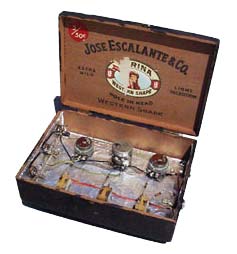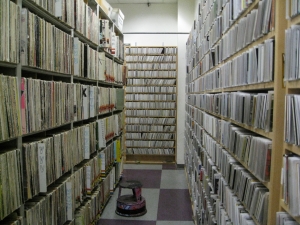June 5, 2014
Spotlight: University of California Berkeley’s KALX
Last Updated on June 5, 2014 by askcbiorg
 Tell me a little history about your station and where your station is now?
Tell me a little history about your station and where your station is now?
Sandra Wasson, General Manager: In 1962 a group of students in one of the residence halls started an AM carrier current station — Radio KAL — that reached several UC Berkeley campus housing units. The first broadcast board was a modified Cuban cigar box. In 1967 KALX hit the airwaves on 90.7 FM at 10 watts. We could only be heard on and near the campus. In 1982 we finally increased power to 500 watts and drastically increased our audience.
Our long and storied history includes covering the free speech movement, broadcasting Oakland A’s baseball games for part of the 1978 season, and interviewing John Lennon and the Dalai Lama.
 We currently broadcast alternative and diverse music programming including live bands and interviews; news a couple of times a day; live sports play by play of football, men’s and women’s basketball and baseball, both home and away games; and a variety of public affairs programs. All of this from a basement in a building on campus.
We currently broadcast alternative and diverse music programming including live bands and interviews; news a couple of times a day; live sports play by play of football, men’s and women’s basketball and baseball, both home and away games; and a variety of public affairs programs. All of this from a basement in a building on campus.
What sets your station apart from other college radio stations?
Lorraine Petel, Publicity Director: I think KALX’s diversity really sets us apart. When listening to KALX music programs, no one knows what is going to come on next, creating this serendipitous effect. Our format makes listeners, and the DJ listen to music differently. Instead of playing one genre for two hours, the DJ has to figure out how to weave at least three different genres into their show cohesively. It really teaches the DJ and the listener about what genres influenced others.
I think our format really creates this community within the station as well, because all of us are trying to figure out different ways on how to expand our horizons, ultimately making all of us take advice on what is awesome from each other. It really brings people together. Our format fosters a musical community within KALX, and allows the listener to teach the DJs something as well. I’ve gotten multiple calls from listeners, telling me about a really great band they know in a genre that I’m not completely educated in, allowing me to explore that genre. Our diversity requirement challenges all of us to really dig deep into multiple genres to create an educational space on the radio.
Why did you choose to work at the radio station?
Petel: I actually knew about KALX growing up. I lived in Miami Beach before coming to UC Berkeley but grew up on a lot of East Bay punk. When I started to really get into the East Bay punk scene, I realized that a lot of the bands had history at KALX. Many of them were actually DJs at KALX. When I got into UC Berkeley, I knew joining KALX was on the top of my list. Not only was it the second home for many of the bands that I grew up on, but it was a place that I knew I could come to learn about music and develop a really strong community with the people at the station.
What’s the craziest thing you’ve ever done for your station?
Arielle Parnes-Katz, co-Music Director: This isn’t really a crazy thing I’ve done for the station, but more so a kind of crazy experience I had at the station. One time I was DJing a 3:30-6am shift and I got a call from someone who told me they were locked in a phone booth and wanted me to leave them on hold so they could listen to our music. I left them on hold, and when I finished my show and the next DJ started they were still there.
 What’s the best part of college radio? And the hardest part?
What’s the best part of college radio? And the hardest part?
Parnes-Katz: For me the best part of college radio has been the opportunities it has provided me to discover new music and share my discoveries with others. We have over 100,000 albums in our library and DJs with such diverse tastes and knowledge that KALX really is a hub of musical knowledge unlike anything I’ve ever encountered before. I’ve heard my show improve so much over the past few years as my own tastes and knowledge have expanded and it’s great to know that the knowledge I have gained while at KALX can be translated to our listeners through my show. The hardest part of working at KALX was probably making it through DJ training shows. To ‘graduate’ from DJ training everyone has to complete seven shows from 3:30-6am.




 We currently broadcast alternative and diverse music programming including live bands and interviews; news a couple of times a day; live sports play by play of football, men’s and women’s basketball and baseball, both home and away games; and a variety of public affairs programs. All of this from a basement in a building on campus.
We currently broadcast alternative and diverse music programming including live bands and interviews; news a couple of times a day; live sports play by play of football, men’s and women’s basketball and baseball, both home and away games; and a variety of public affairs programs. All of this from a basement in a building on campus. What’s the best part of college radio? And the hardest part?
What’s the best part of college radio? And the hardest part?